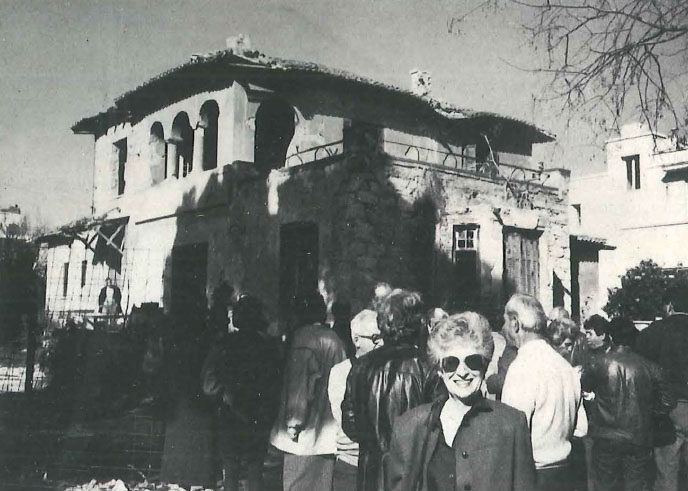Early in the 1960s, a young American Foreign Service officer and his family were posted to Greece. They were pleased with the assignment, for the position was challenging and Greece was an idyllic place in which to raise two young girls. They settled in a house in Psychiko where, in those days, neighbors had the time and inclination to chat across unfenced borders.

In this way, Ed and Elly Cohen made the acquaintance of Paris and Clara Taveloudis, who lived in a spa-cious villa next door. A former director of the Ionian Bank, Taveloudis was also a renowned author whose books had appeared under the pseudonym of ‘Kosmas Politis’ since the early 1930s. His first novels of the Athenian beau monde were written with the sentiment of an older tradition, and though he proved himself to be powerful in his later fiction, both he and his wife reflected the charm and courtesy of the vanishing world he had captured in his earlier works.
Despite the disparity of age and background, the Taveloudis and the Cohens became friends. The Taveloudis were already in their 70s. Their only daughter had died during child-birth, together with their grandchild, and they took a lively interest in the young American family that had moved next door. ‘Tante Clara’, as she asked the Cohen children to call her, was the daughter of an Austrian diplomat whom Paris Taveloudis had met in Smyrna.
Encounters between the two families became easy and informal. Tante Clara would often take a shortcut through the garden to go to the Cohens’ house. On the day of President Kennedy’s assassination, the Taveloudis sent flowers to the Cohens in an effort to express the sadness they shared.
Those happy days abruptly ended when Tante Clara suffered a heart attack and died on the morning of the junta takeover, 21 April 1967. The Cohens joined the small group of mourners to comfort Mr Taveloudis at her funeral, but times grew worse quickly. The widower was arrested by the military government. The Cohens joined others in actively petitioning to have the 80-year-old gentleman released. Through these efforts, he was able to return home soon.
Moving on to another post, the Cohens continued to exchange Christmas letters with Mr Taveloudis for several years. Then his letters stopped, and the Cohens learned that he had died.
Almost twenty years later, Ed and Elly Cohen were transferred back to Greece. Now Ed was Deputy Chief of Mission, having served the United States government in increasingly responsible positions. Settling again in Psychiko, they naturally went to visit their old neighborhood. Their former home was as they remembered it, but the once lovely house at the corner which had belonged to Paris and Clara Taveloudis lay desolate and abandoned in the middle of a plush neighborhood. Its beautiful roof tiles sagged, patches of brickwork were exposed where plaster had fallen, and the door stood askew on rusty hinges. Most ignominious of all, the property around the house had become a dumping ground for builders, and a rubbish heap for neighbors and passers-by.
The Cohens investigated the matter and wrote letters to officials asking about the condition of the house, but to no avail. Unable to disentangle the legal complexities of ownership, they watched helplessly through the years as the building grew more derelict. Graffiti appeared on every available blank space and the piles of refuse climbed higher.
Then one day late in 1989 a minor miracle seemed to have occurred: the Cohens found the garden and what could be seen of the interior of the house cleared of rubbish. Soon another even greater miracle transpired when a two-metre fence was erected around the property. And then – buried within one of those printed notices periodical-ly sent out by the Psychiko municipality usually advising the cutting off of some utility or other – Elly Cohen was delighted to read that all residents and friends of Psychiko were invited to attend at 11:30 am on Tuesday, 19 December the blessing and dedication ceremony of the Kosmas Politis house, which would become the new municipal building. The house was to be preserved and, most important of all, a major Greek author would be honored and his work commemorated.
Elly Cohen was present, with a throng of people, when the priests of Saint Dimitrios, the Mayor of Psychiko, Dimitris Manaos, and various benefactors gathered to dedicate the house of Kosmas Politis. There was a new sense of life already beating about the place, even though it must have been humiliating to receive so distinguished a group on such a sagging veranda.
Nevertheless, the mayor promised that within ten months all work would e completed and that those present would then meet once again when the municipality moved from its current cramped and temporary quarters in the former Blue Bell restaurant to the newly-restored villa located on the junction of Stratigou Kallari and Kosti Palama.
Ed and Elly Cohen may have finished their tour by then, and moved on to another great city. However, they will go with memories intact and confidence restored that a very special friend continues to be honored in the villa on a corner in Psychiko.
Kosmas Politis (1893-1974), pseudonym for Paris Taveloudis. Novel: Lemon Grove (1928) became very popular because of its excellent descriptions, beautiful dialogue, and psychological insights into characters. Other works: Hecate (1933); Eroica (1938), which became a landmark in modern Greek prose; Three Women (1943), a collection of short stories; Plum Tree and Other Stories (1946); and Constantine the Great (a play, 1957). Terma, unfinished at the time of his death, was published by Hermes Publishing Co. with notes by Matina Papoulias; now in its second edition.







